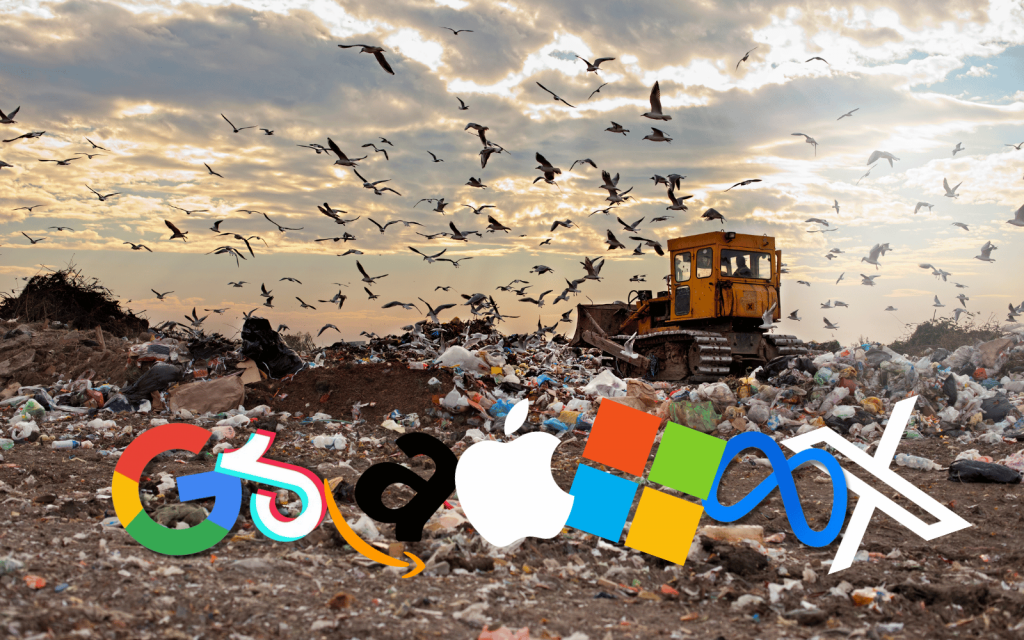In a portent of things to come in 2024, Google lost the first of many major antitrust lawsuits on 11 December 2023.
After a month in a San Francisco courtroom, Google was found guilty of all 11 counts of anticompetitive behaviour by a jury, in a case brought by Fortnite-maker Epic Games. Further arguments will be made this month but that decision is likely to have a major – potentially existential – impact on Google’s Android business. It charges app developers a 30% fee for sales through its Play store for mobile apps – something that the jury found had reduced competition.
Democratic Senator Amy Klobuchar immediately said the United States “must take the next step in Congress to finally update our consumer laws for the digital age”.
Google still faces two more huge antitrust cases that will be decided later this year. In a 10-week trial, which ended last month, the Department of Justice made a strong case that Google’s search business is a monopoly. Closing arguments will be heard in May 2024, but the prognosis is pretty bad for the $280 billion search business.
In a clearly anticompetitive deal, Google pays Apple a whopping 36% of search revenue generated by being the default search engine on iPhones and iPads – of which over 1 billion have been sold.
Google’s senior vice president for Search, Prabhakar Raghavan, revealed Google paid $26.3 billion in 2021 to be the default search engine for Apple, Samsung and other smartphones. Using this figure, Digital Content Next CEO Jason Kint estimates that Google makes “at least $90 billion of its current annual revenue in search default deals”.
In an embarrassing email that Google fought to keep private, its vice president for finance Michael Roszak wrote that only “illicit businesses (cigarettes or drugs) that [sic] could rival these economics”.
Surveillance capitalism is a good business
As Microsoft CEO Satya Nadella said when called to testify about trying to replace Google with Microsoft’s own Bing search engine: “You get up in the morning, you brush your teeth, and you search on Google.”
Stating the obvious, he said: “Everybody talks about the open web. But there is really the Google web”.
Similarly, Facebook‘s parent company Meta is facing several significant lawsuits. The most damning (and damaging) of those contain revelations that it knew about the mental health dangers for teenage girls using Instagram but ignored them.
Facebook “designed psychologically manipulative product features to induce young users’ compulsive and extended use” of Instagram, according to the lawsuit filed by the attorneys general of 42 States in October. “Its motive is profit.”
In November, portions of this lawsuit were unredacted, revealing that Meta executives were fully aware of the mental health threats.
“It’s not ‘regulators’ or ‘critics’ who think Instagram is unhealthy for young teens, it’s everyone from researchers and academic experts to parents,” wrote Karina Newton, Instagram’s head of policy, in an email in May 2021. “The blueprint of the app is inherently not designed for an age group that don’t [sic] have the same cognitive and emotional skills that older teens do.”
As whistleblower Frances Haugen revealed that Facebook “prioritise profit over safety” a few years ago, another 2018 email points out “the lifetime value of a 13 y/o teen is roughly $270” to Instagram. For $270, under-13s were being exposed to content the picture-sharing app knew they didn’t “have the same cognitive and emotional skills that older teens” have to handle it.
In another email to Instagram head Adam Mosseri in August 2021, spokeswoman Stephanie Otway wrote: “Our own research confirmed what everyone has long suspected”.
Meanwhile, CEO Mark Zuckerberg’s still-born metaverse concept seems to have been shelved, having burnt through $36 billion without more than awkward and legless avatars in a poor simulacrum of a video game from the 1990s. It flopped for many reasons, but in no small part because the virtual reality (VR) promise of a metaverse was eclipsed by another technology – which actually worked and didn’t require a $400 VR headset.
The Skynet clock is ticking
OpenAI’s gobsmacking artificial intelligence (AI) chatbot, ChatGPT, has been the darling of the tech world since its launch on 30 November 2022. It reached 1 million users in five days and is the poster child of the generative AI movement.
OpenAI CEO Sam Altman was inexplicably fired in November 2023 by a board seemingly concerned about the threats of AI and wanted to reign in its commercialisation. They achieved the exact opposite when Microsoft hired Altman who then returned to OpenAI without that board after almost all of its staff threatened to quit. AI commercialisation 1, AI oversight 0.
In the five days from his Friday firing – for which Microsoft was given literally one minute’s notice, despite its 49% shareholding through a $13 billion investment – to Altman’s Tuesday return as CEO, the world experienced a significant change. The consequences of this change will unfold over the years, but already AI experts – who have been warning about potential dangers for years – are concerned that AI will become too powerful and perpetuate the same biases as us Homo Sapiens.
Although the US, UK, EU, and China signed a significant treaty to work together to monitor AI development, called the Bletchley Declaration, these fears are – and should be – front of mind as the game-changing technology becomes more widespread.
Everyone’s having a turn
Google’s Bard and Amazon’s Q are playing catch up to OpenAI, which powers Microsoft’s Copilot – and everyone in Big Tech and Silicon Valley is throwing money at AI startups.
Microsoft Africa president Lilian Barnard says “analysts predict we can increase the African economy by 50% if we capture just 10% of the global AI market” of what she calls “truly the most defining technology of our time”.
The two biggest players in internet advertising – Google and Facebook – will also continue to face existential threats to their revenue models due to the various court cases and new EU privacy and marketplace laws – the Digital Services Act (DSA) and Markets Act (DMA).
Read More: Big Tech meets Big EU
While they do, one of the greats, the most beloved of social networks, Twitter, is likely to die in 2024.
Once considered a genius, Pretoria-born Elon Musk has destroyed the platform he’s renamed X. After buying it for $44 billion in October 2022, it has halved in value, he’s admitted. His erratic, impulsive decisions and the firing of 80% of its staff (including content moderation teams) have seen advertisers flee the “digital town square”.
Instead of saving it, the self-styled “free speech absolutist” has wrecked it.
The final straw seemed to be Musk’s endorsement of an antisemitic conspiracy theory in November by tweeting it was “the actual truth”. A day later, a hate speech group published its analysis of how posts glorifying Hitler and Nazis were appearing next to adverts from Apple, IBM, Oracle, Bravo and Xfinity. Musk’s antisemitic tweet also saw Warner Bros, Paramount, Sony Pictures, Comcast/NBCUniversal and Lionsgate “pause” their advertising.
Musk sued the hate speech organisation – Media Matters – blaming it for manipulating Twitter’s algorithm in a sad, sad display of bullying by the world’s richest person.
Musk eventually apologised for his slur – which saw an estimated $75 million of advertising revenue lost for the final quarter of the year – at a New York Times investor event. Known for his erratic and impulsive behaviour, Musk put the final nails in Twitter’s coffin with an unforgivable and indefensible rant.
“Don’t advertise,” he said, adding: “If somebody’s going to try to blackmail me with advertising, blackmail me with money? Go fuck yourself.”
He then slowly and deliberately added: “Go. Fuck. Yourself. Is that clear?”
Expect more victim blaming from Musk and the slow, inevitable collapse of X, once known as the thriving social network Twitter.
Read More: ‘Hallucinate’ was the perfect word for 2023
TikTok is now the dominant social media platform, sucking up all those advertisers Musk told off. With over a billion users, it’s the place where all of the youth – and therefore future consumers – find their entertainment and increasingly news. The Russian invasion of Ukraine last February was arguably the tipping point for TikTok’s new supremacy, although its web traffic has long since eclipsed all the previous (American) tech giants, including Google.
However, the Chinese-owned platform is rampant with misinformation (including that the Titanic never sunk) and privacy concerns. The EU fined it €345 million for its lax privacy setting that makes new accounts “public-by-default”, including accounts for under-13s.
The EU’s very strict General Data Protection Regulation (GDPR) privacy legislation is arguably the best thing to happen to the internet since the internet itself. Unlike the free-for-all allowed by US laws, Europe is holding social platforms and tech giants to account, especially with the DSA and MSA that were enacted last year and will provide the basis for an expected crackdown this year.
The two major tech themes for 2024 will be the rise and rise of AI and the fall of privacy-stealing surveillance capitalism. The latter can’t happen soon enough.
- This column first appeared in Daily Maverick 168.




